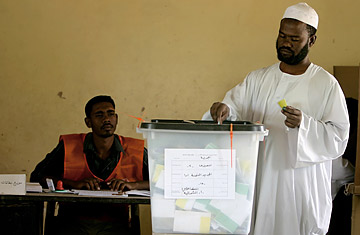
A man casts his ballot at a polling station in the city of al-Kamlin, Sudan, on April 15, 2010
As voting ended on Thursday in Sudan's first multiparty general election in 24 years, voters could be forgiven for feeling disappointed. The national vote, say opposition parties and some observers, was rigged, and it will likely cement the presidency of a man who has been indicted for war crimes. Still, the entire exercise was backed by the international community. Asked by a reporter last week whether the U.S. was "ready to sign off on the results no matter how flawed the actual process in this election" was, U.S. State Department spokesman Philip Crowley answered, "What is the alternative?"
The alternative that appears to have persuaded Washington and much of the international community to support the questionable election is a return to war in Africa's largest country. Already, the crisis in Darfur has claimed some 300,000 lives, while 2 million have died in a half-century of civil war between Sudan's north and south. Those numbers may have persuaded the international community to subordinate democracy to the cause of peace, but a slew of opposition groups withdrew from the presidential election ahead of the poll — citing repression and the expectation of vote-rigging — leaving no serious challengers to the incumbent, President Omar Hassan al-Bashir. In the upside-down world of Sudanese politics, it was the party that fought hardest for democracy that pulled the plug on the country's moment of "democratic transformation": the Sudan People's Liberation Movement (SPLM), which led the south in a decades-long struggle against the regime in Khartoum, was the first to withdraw from the election, eliminating the candidacy of Yasir Arman, the man seen as able to present the strongest challenge to al-Bashir. Sudan's ruler of 20 years, who last year became the first sitting head of state to be indicted by the International Criminal Court (ICC) in the Hague, is now a presidential shoe-in.
Reactions in some quarters have been harsh. The U.S.-based anti-Khartoum advocacy movement accused the U.S. of endorsing a "sham" election. The ICC's chief prosecutor, Luis Moreno-Ocampo, likened the task facing foreign observer teams to "monitoring a Hitler election." Amid such criticism, the U.S. special envoy to Sudan, Major General Scott Gration, headed to Sudan to try to salvage the sinking electoral ship but ended up only enraging al-Bashir's northern opposition by expressing his confidence that the vote would be as "free and fair as possible." John Ashworth, a veteran of 27 years in Sudan now working for the IKV Pax Christi aid group, says the world should have known better. "Nobody (except ignorant foreigners) ever expected the elections to be free and fair," he wrote in an e-mail.
Holding the election was required by the U.S.-brokered 2005 Comprehensive Peace Agreement (CPA), which ended the second of two long civil wars between the country's north and south. That conflict was the longest running of several between the Arab, Islamist government in Khartoum, which has lavished resources on itself and its capital city, and separatist groups across Sudan's periphery, which have been marginalized for decades.
The peace deal's grand finale is to come in January 2011, when the south will hold a referendum on full independence. Southern secession is a painful prospect for the north, not only because of the loss of territory, but because most of Sudan's oil output is pumped in the south. So, to its backers, this week's election represents a vital first step on what promises to be a fraught road. "Without this election, there is no way to go forward to the referendum and the culmination of the peace agreement," former U.S. President Jimmy Carter told TIME while monitoring the voting in South Sudan's capital, Juba. "I'm not predicting tragedy, but I don't have much doubt that if the entire CPA has to be abandoned, there will be conflicts re-emerging in this country."
Some caution that expecting perfect elections is unrealistic in a country so precipitously balanced between war and peace. Neha Erasmus, the South Sudan coordinator for the advocacy group Justice Africa, says the decision to pull Arman from the race was a good one. By not contesting the presidential vote, she says, the SPLM refuses to endorse a flawed process but also avoids destabilizing relations with its partner in peace.
The choice did not always play well on South Sudan's streets. "Many people in the south wanted to vote for Yasir," says Moses Duku, a Juba motorbike taxi driver. "Who are we to vote for now?" But with prospects dimming for the realization of the CPA's vision of a new, united Sudan, many in the south are looking to the peace deal's final exit clause. "It's clearly mentioned in the CPA that you need the elections to happen," says Edmin Baba after casting his first ever vote. But, he adds, "the referendum, of course, for every southerner, is the ultimate election."
